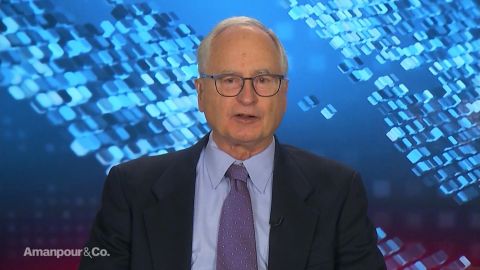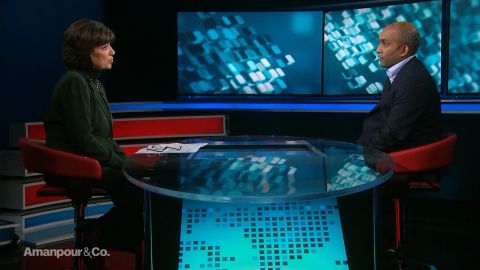Read Transcript EXPAND
CHRISTIANE AMANPOUR: What does the International Rescue Committee say to governments who are
selling arms right now?
SANJ SRIKANTHAN: Well, there’s two sides to this problem. The first you correctly point out are huge arms sales to Saudi Arabia. It’s not the sales themselves that are resulting in civilian deaths and the death of children in Yemen, it’s what’s being done with those weapons. So, our point is, governments who have influence, either through arms sales or other ways over the Saudi-led coalition should call upon all those who, by the way, have conducted 18,000 air strikes since 2015, to stop bombing civilians and humanitarian aid workers. Because until that happens, we can’t get aid in, people can’t go out and get food and tragic scenes like the ones you’ve just shown will replay itself out maybe as many as 14 million times.
AMANPOUR: It was a shock when we heard that that many people face very, very imminent disaster. We are told by the U.N. the World Food Programme, that they have enough cereals maybe to last another two months. From your experience from the IRC and Human Rights Committee and the aid community, what happens when cereals and that kind of meager food runs out in two months? Is there a pipeline that you can easily resupply? What happens.
SRIKANTHAN: Cereals and food supplies exists in the world. The supplies are there. We could always do with more but the access isn’t. Hudaydah port is nominally open. But, in fact, they’re accused to get burst, they’re not allowing large container ships. So, it’s like a strangle hold of food, and this port is meant to supply 70 percent of what Yemen needs. So, at the moment, it’s supplies it can’t get out and people can’t get to the supplies. So, we are watching a tragedy that is preventable, both through the association of air strikes on civilians but also opening up ports like Hudaydah.
AMANPOUR: And when you they are not letting it, who?
SRIKANTHAN: At the moment, are call is on the Saudi-led coalition to allow aid to get in through Hudaydah Port. But it’s calling on both sides to a larger amount of access, at the moment through a series of checkpoints, permission slips, et cetera, they’re effectively creating barriers to the most vulnerable. And our risk is the tactics on the ground are changing towards besiegement. And as we’ve seen in Syria and other places, this is where civilians get caught up in a military tactic that results in starvation. It’s a very sad thing but one I’ve seen in many conflicts.
AMANPOUR: Well, Sanj, you know part of your history and your experience has been with the British army, you spent many years as an officer. So, give us your military analysis of what you just described as siege tactics, as squeezing these populations, as we’ve seen over and over in Syria. It was a siege and starve and surrender tactic, wasn’t it?
SRIKANTHAN: Many times, in conflicts, these tactics extensively used to reduce the number of casualties on both sides. But when civilians are caught in the middle of that besiegement, what ends up happening is that they are subject to starvation tactics that are being used as part of a war effort.
About This Episode EXPAND
Christiane Amanpour interviews Sanj Srikanthan, Executive Director of the International Rescue Committee UK, about Saudi Crown Prince MBS’s role in the war in Yemen and author Fox Butterfield about his new book on the influence of family on crime. Michel Martin interviews Jahana Hayes, 2016 National Teacher of the Year and a Democratic Nominee for U.S. Congress.
LEARN MORE


